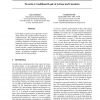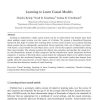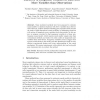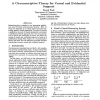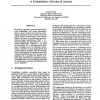104
Voted
AI
2004
Springer
15 years 2 months ago
2004
Springer
In this paper we present a new approach to reason about actions and causation which is based on a conditional logic. The conditional implication is interpreted as causal implicati...
112
Voted
JMLR
2008
15 years 2 months ago
2008
Causal reasoning is primarily concerned with what would happen to a system under external interventions. In particular, we are often interested in predicting the probability distr...
119
Voted
CORR
2010
Springer
15 years 2 months ago
2010
Springer
The causal Markov condition (CMC) is a postulate that links observations to causality. It describes the conditional independences among the observations that are entailed by a cau...
122
click to vote
COGSCI
2010
15 years 2 months ago
2010
We used a new method to assess how people can infer unobserved causal structure from patterns of observed events. Participants were taught to draw causal graphs, and then shown a ...
113
click to vote
COGSCI
2010
15 years 2 months ago
2010
Learning to understand a single causal system can be an achievement, but humans must learn about multiple causal systems over the course of a lifetime. We present a hierarchical B...
122
Voted
ICANN
2010
Springer
15 years 3 months ago
2010
Springer
Many statistical methods have been proposed to estimate causal models in classical situations with fewer variables than observations. However, modern datasets including gene expres...
IJCAI
1989
15 years 3 months ago
1989
1 describe an approach to the problem of forming hypotheses about hidden mechanisms w; thin devices — the "black box" problem for physical systems. The approach involv...
112
Voted
AAAI
1990
15 years 3 months ago
1990
Reasoning about causality is an interesting application area of formal nonmonotonic theories. Here we focus our attention on a certain aspect of causal reasoning, namely causaZ as...
115
Voted
AAAI
1992
15 years 3 months ago
1992
models require the identi cation of abstractions and approximations that are well suited to the task at hand. In this paper we analyze the problem of automatically selecting adequ...
108
Voted
UAI
1994
15 years 3 months ago
1994
Wepresenta symbolicmachinerythatadmits bothprobabilisticand causalinformation abouta givendomainand producesprobabilisticstatementsabouttheeffectofactions andtheimpactof observati...
